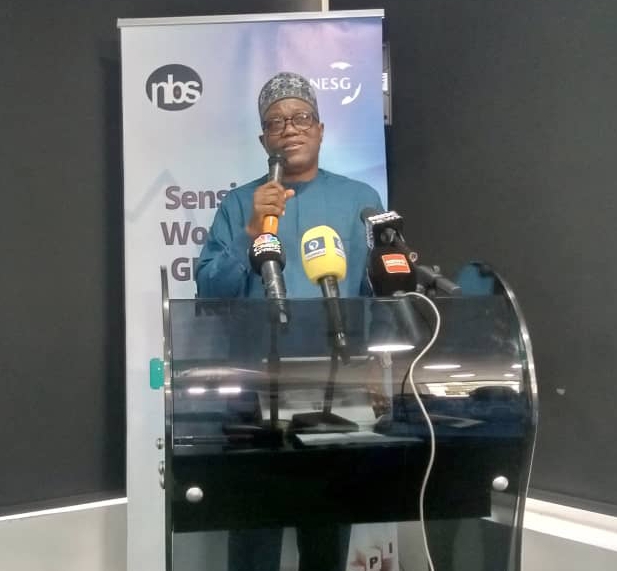The National Bureau of Statistics (NBS) and the Nigerian Economic Summit Group (NESG) have harped on the essence of the proposed rebasing of the nation’s Gross Domestic Product (GDP) and the Consumer Price Index (CPI), saying that it was to ascertain accurate data of economics realities and apply them for realistic economic planing for development.
The Statistician General of the Federation, Prince Adeyemi Adeniran and the Chief Executive Officer of the NESG, Dr. Tayo Aduloju, spoke at the Sensitization Workshop on GDP and CPI Rebasing Organised by the Nigerian Economic Summit Group in Collaboration with NBS, on Thursday in Lagos.
Prince Adeniran explained that the Rebasing is a vital exercise that ensures our economic indicators are current and accurate reflections of the economic realities on the ground.
According to the NBS CEO, “As economies evolve, new industries emerge, and consumption patterns shift, it becomes imperative to update our statistical measures to capture these changes.
“Rebasing our GDP and CPI allows us to align with these transformations, providing a more precise and relevant picture of Nigeria’s economic landscape.
“This process is foundational to informed policymaking, strategic planning, and effective governance; hence, it is one exercise that the NBS is conducting with significant importance and professionalism.
“If Nigeria is to make the desired progress and development, it is imperative that NBS, as the official producer of data, plays its role adequately in providing timely, accurate, and reliable statistics to inform all users, both in the public and private sector, to enable them design, plan and implement policies and programs that will lead to the attainment of national objectives.
“Our mindset in undertaking both critical assignments is to ensure that our processes are open, collaborative, and rigorous, making sure that, as much as possible, we leave no stone unturned in our bid to measure and report accurately, the size of economy and the level of price changes.
“The rebasing exercise is designed to ensure that our economic indicators accurately reflect the current structure of our economy, incorporating new and emerging sectors, updating our consumption baskets, and refining our data collection methods. This is our responsibility as the official producer of data in Nigeria.”
On his part, the CEO of NESG, Dr. Tayo Aduloju, explained that Economic (GDP) rebasing, in essence, is a recalibration – “an exercise with profound significance and akin to cleaning the lenses through which we view our economy, allowing us to see a clearer, more accurate picture of its structure, size, and potential.”
“As economies evolve, new industries emerge, technology transforms markets, and the contributions of different sectors shift. Without updated economic measurements, we risk underestimating our true economic capacity”, he said.
He noted that the Nigerian Economic Summit Group, through one of its four strategic roles in the country, has continually watchdogged the economy and leveraged empirical analysis, evidence, and rigorous research to drive evidence-based policy advocacy.
He recalled that through a similar rebasing in 2014, the nation’s GDP leapt by nearly 90%, elevating Nigeria’s economy to $510 billion and positioning it ahead of South Africa as the largest economy in Africa.
According to him, “Sectors like telecommunications, real estate, and the creative industries—once invisible in old metrics—came into full view.
“We must acknowledge the immense value of rebasing our economy to identify new growth engines, which are indispensable for crafting evidence-based policies to strengthen sectoral performance and enhance growth.”
He maintained that accurate data enhances credibility and sharpens policymaking.

 Business News1 week ago
Business News1 week ago
 News1 week ago
News1 week ago
 News1 week ago
News1 week ago



























